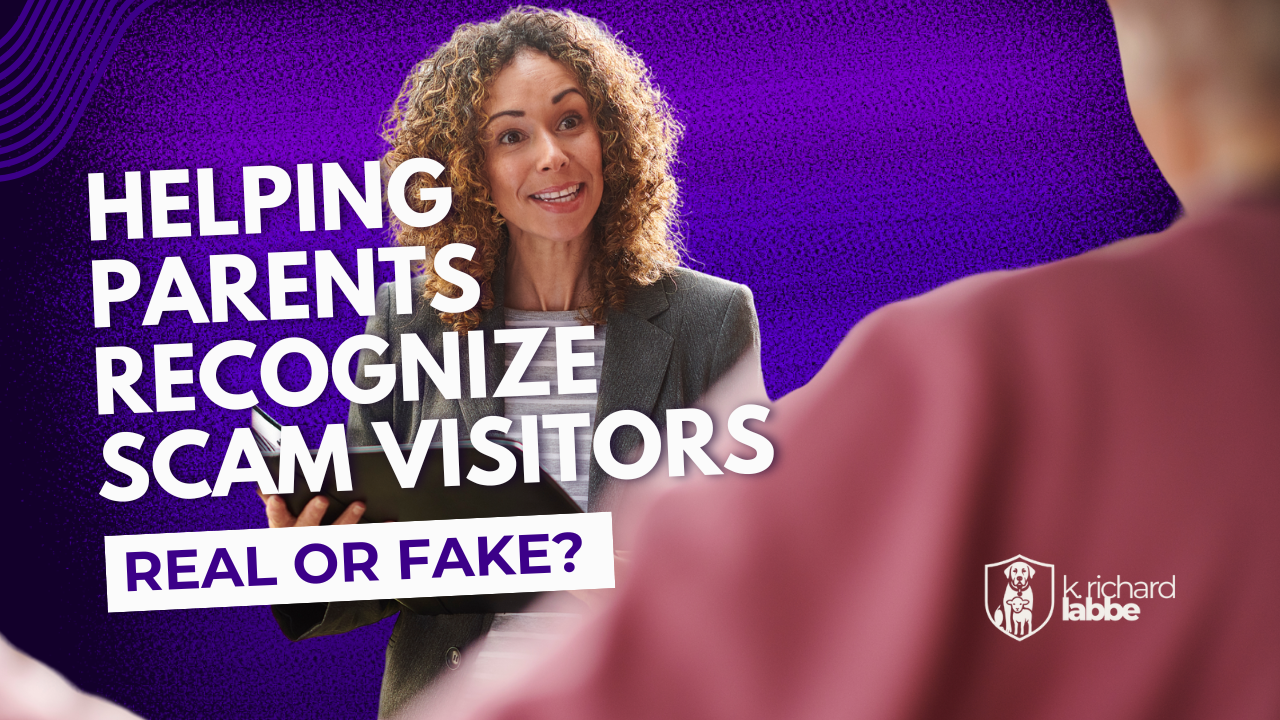Helping Parents Recognize Real vs. Fake “Official” Calls or Visitors
Scammers are getting smarter—and more convincing. If you’re caring for an aging parent or vulnerable adult, helping them recognize fake “official” contacts isn’t optional. It’s stewardship. It’s love. And it can save more than just money.

When “Official” Doesn’t Mean Safe
It usually starts politely.
“Good afternoon, Mrs. Palmer. I’m calling from Medicare. We just need to verify a few details to make sure your benefits continue…”
Or they show up in a safety vest and ID badge, claiming to be from “the water company,” saying there’s an emergency and they need access to the basement—now.
To someone who grew up in a generation that trusted authority, uniforms, and courteous voices, these interactions may feel safe. Familiar. Even respectful.
But that’s exactly what scammers count on.
Why This Scam Works So Well
Today’s fraudsters don’t lead with threats. They lead with plausibility.
They use:
- Real-sounding names like “Federal Claims Division” or “Utility Verification Services”
- Spoofed caller IDs that appear to come from government or local numbers
- Urgent, polite scripts designed to disarm and confuse
- Uniforms and clipboards to look just official enough at the door
And they target people who:
- Are home alone during the day
- Grew up trusting door-to-door service and landline calls
- Want to avoid trouble or losing benefits
- May be embarrassed to ask for help
“The prudent see danger and take refuge, but the simple keep going and pay the penalty.”
— Proverbs 27:12 (NIV)
This isn’t about being gullible. It’s about being targeted. And our parents and grandparents deserve our help and guidance.
What You Can Do as a Son, Daughter, or Caregiver
You don’t need to instill fear. But you do need to open the conversation. Here’s how.
Start with empathy.
Instead of, “Mom, you have to stop trusting people,” try:
“There are a lot of tricky scams going around these days. Can we walk through a few examples together—just so we’re ready if anything strange comes up?”
Keep it collaborative, not corrective.
Practice scenarios.
Give real-world examples:
- “If someone calls claiming they’re from Medicare, what would you do?”
- “If someone says they’re from the water company and need to come inside, what would you ask?”
Let them talk it through, then gently offer safer ways to respond.
Create a simple rule: Never give info. Never let them in.
Say it like this:
“If they call, hang up. If they knock, don’t open. If it’s real, they’ll wait while you confirm or call me.”
This isn’t paranoia. It’s a peacekeeping routine.
What About Legitimate Visitors?
Yes, sometimes real utility workers or first responders show up unannounced. Gas leaks, water main issues, or electrical emergencies do happen.
So how can your loved one verify someone without risking their safety?
Here’s a 3-step plan:
1. Stop at the door—but don’t open it.
Encourage them to speak through the door or screen:
“I don’t open the door to unannounced visitors. Who are you with?”
2. Ask for ID and written notice.
Every real worker should:
- Show ID without hesitation
- Name their company and reason for the visit
- Provide a physical work order or safety notice
They can say:
“Please hold your ID up to the window.”
“Can you leave the notice on the porch for me to read?”
If the visitor argues or refuses, that’s a red flag.
3. Verify before cooperating.
Even if they say it’s urgent, your loved one has the right to confirm.
- Call the utility company using a number from their last bill—not a number the visitor gives.
- Call you or another trusted contact.
- If the person claims to be law enforcement, your parent can calmly say:
“I’m calling 911 to confirm there’s an official response happening. Please wait right there.”
Real officers and utility workers will understand. Scammers will not.
Leave Them with the Right Tools
Make it easy to say no.
- Tape a note near the phone: “Never give personal info. Call [your name] first.”
- Post a reminder near the front door: “We do not allow unannounced visitors. Please leave paperwork and call back later.”
- Program key numbers into their phone—your number, the electric and water company, Medicare, the local police non-emergency line.
Simple steps. Big impact.
A Word to Families and Friends
If someone you love keeps getting drawn in, don’t mock or scold. That only isolates them further.
Instead:
- Stay in regular contact
- Ask open questions without judgment
- Offer to sit in on important calls
- Rehearse responses together
“Carry each other’s burdens, and in this way you will fulfill the law of Christ.”
— Galatians 6:2 (NIV)
This isn’t about control. It’s about compassion—and covering each other wisely.
Do This Today
- Print a trusted contact list and place it by the phone.
- Practice a 10-second script your loved one can use at the door or on the phone.
- Check that their phone and door area are set up to support safe decisions.
- Remind them: If they ever feel unsure, they can always call you first. No pressure. No shame.
Final Word: Prepared, Not Paranoid
Your loved one isn’t naïve. They just come from a different time—and today’s scams weren’t part of it.
But with your help, they can learn the cues, build new habits, and face the future alert but at peace.
Prepared, not paranoid. That’s how we protect what matters.
Stay safe. Be ready. Online and off.
Every effort has been made to ensure the accuracy and reliability of the information presented here. While Labbe Media, LLC strives to offer clear, well-researched guidance, this content is intended for educational purposes only and isn’t a substitute for professional advice tailored to your situation. We encourage you to use this material as a starting point—and to double-check details and consult trusted professionals when making important decisions.
